My Job Hunt Story
feat. ThanksButNoThanksCorp
You go to university and meet thousands of students who each have their own interests and goals. But come graduation time, everyone starts doing the same thing.
Everyone hops on the hamster wheel of job interviews.
You’ve got the business bros who milk their connections, the tech bros who spend all their time on Leetcode, and then you’ve got confused philosophy bros like me who are still trying to figure out what they want to do.
It was Jan 2019. I was an international student graduating in 3 months. If I wanted to remain in the country, I’d need to get a job.
And to get a job, I would also need to find an employer who would be willing to sponsor me. Sponsorship is hard. It requires money (around $3k), but that’s not the challenging part.
The challenging part is the lottery - you have a roughly 30% chance of getting a H1B visa. Most employers are not willing to tolerate that level of uncertainty. Why hire someone on a visa who might have to leave the country tomorrow when you can hire an American instead?
Now, if you don’t get the H1B visa, you can still work.
Pay attention. This is important.
There’s something called OPT (Optional Practical Training) which means that you’re eligible to work for 12 months (and for students that studied a “STEM subject”, 36 months) without an H1B visa. And this requires no sponsorship. It’s often used as a precursor to the visa, but nothing’s stopping you from just working on OPT for 12-36 months without needing your employer to submit a $3k visa application.
But your average US employer isn’t aware of this - for them, it’s very black or white. You either need sponsorship to work or you can’t work. You’re either American or you’re not.
You’re probably wondering why I’m telling you this. Well, this is how this story begins.
One night in Jan 2019, as I was once again scrolling through company career pages, I came across a pretty cool role. It was a rotational product manager type role for a new grad at a big tech company. Google and Uber are famous for having their own versions of this role.
I won’t name the tech company, but it has more than 1,000 employees and a pretty sweet office in San Francisco. For the rest of this piece I will refer to it as ThanksButNoThanksCorp.
So. Anyways. I upload my resume. Bang out a cover letter (you know the type - I want to work at X because of A,B,C….please for the love of god hire me) and press upload.
I then reach the part of the form that every immigrant in the United States hates reaching.

For context: I had at this stage probably sent out close to 30 applications in which I had marked this field as “Yes” and I had heard back a grand total of zero times.
So this time, I decided to mark the field as “No”.
As I explained above, every international student has access to OPT, and as a STEM major (one of my majors was Environmental Economics & Policy), I had access to 36 months of OPT. So 3 years during which I would need zero sponsorship. 3 years where I could work hassle free without the threat of having to leave the country.
But then again, after those 3 years, I would indeed need sponsorship. Am I going to stay at my first ever job for more than 3 years? I don’t have a fortune cookie on me but I don’t think so.
So whether I made the right choice or not when marking that sponsorship field, I’ll let you decide. But in any case, I went ahead, selected “no, I will not require sponsorship in the future” and submitted my application.
2 days later I got an email for a “digital interview”. Game on.
Little did I know the situation I’d be in 2 months time.
Early Rounds
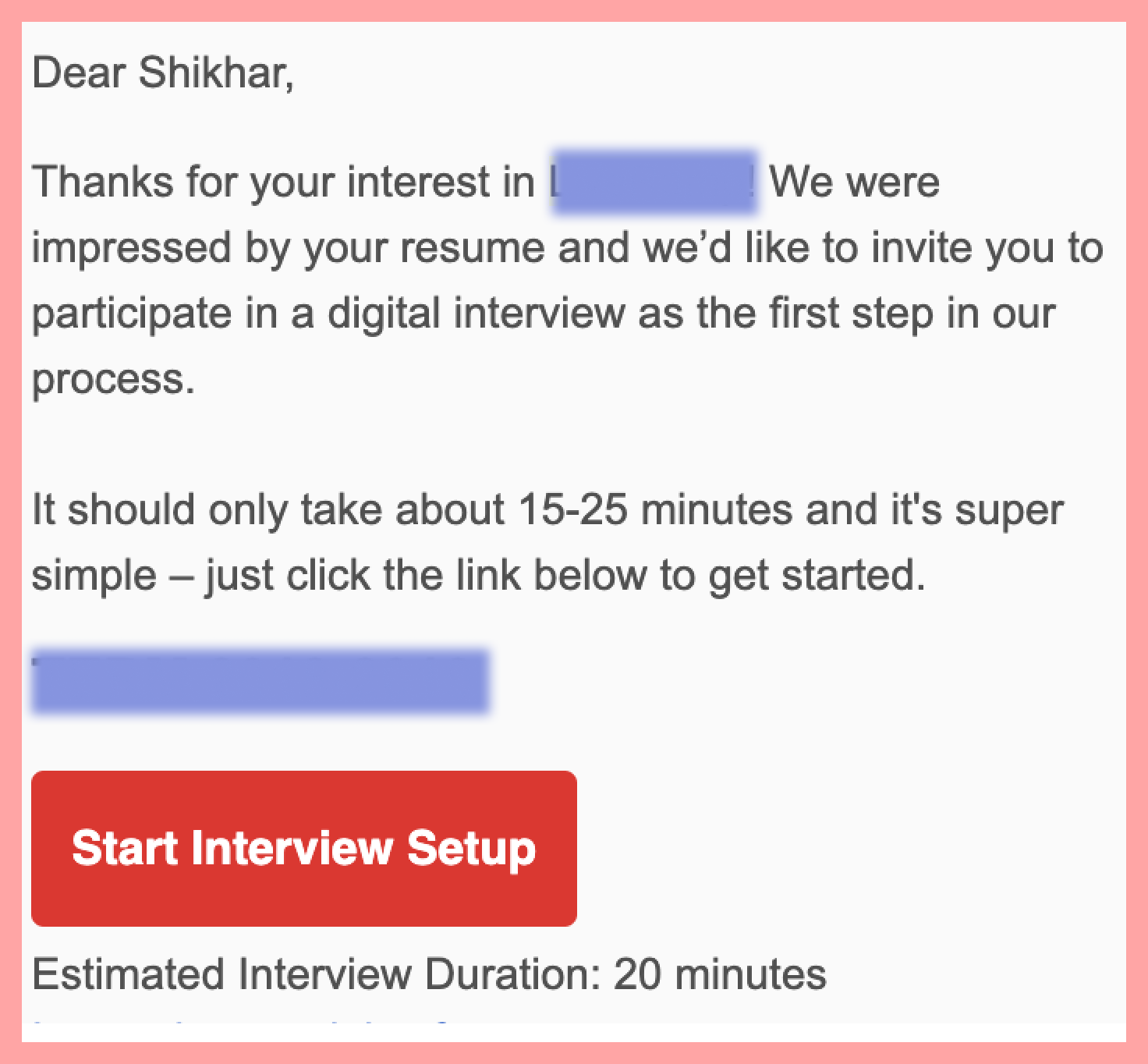
What the hell is a digital interview? I googled around and you’re basically just speaking into your webcam. A bit strange but I don’t get to decide the rules of the game.
I went on Glassdoor, prepped for some basic questions like “Why X” or “Tell me about yourself” and wrote all that stuff down on a piece of paper. I press the button and sure enough - I’m asked to speak into my webcam and answer a few basic questions.
The whole thing takes around 20 minutes and goes pretty smoothly. Well, as smooth as speaking into your computer, pretty much talking to yourself, can go.
About a week later, I get another email. They want to set up a phone interview with me.
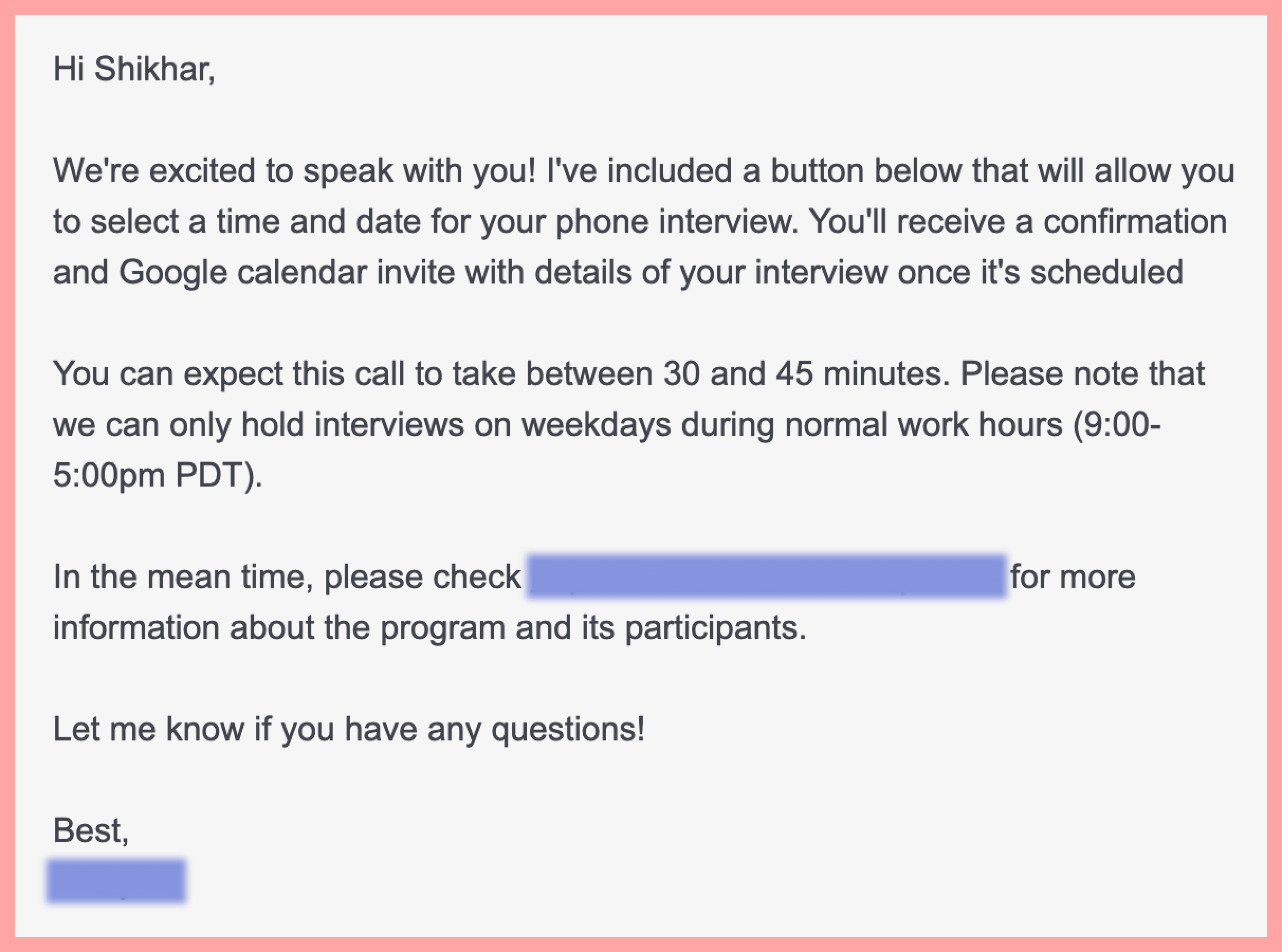
Cool beans. I let mom and dad know. A phone screen isn’t a big deal but I’m excited about where this could go. I want to stay in the States. I’ve met my closest friends here. Salaries are high. Going back would mean failing, right?
Fast forward to two days later: I’m on the phone interview, speaking to an Indian guy who’s name can be abbreviated to Dev. He asks me some questions about myself - those are fine.
But then he asks me a case interview question, one that’s common for consultants to get. I’m not a fan of these types of questions. Give me time to prepare, analyze data, make up my mind, and I can give you an answer as good as anyone.
Ask me to do it on a phone call, though, just right there and then? No bueno.
He asks me some questions about redesigning San Francisco. He wants to test whether I can be comfortable under the uncertainty of a hypothetical question with multiple unknowns. Consultants would call this a measure of my structured problem solving skills.
Good thing I’m not a consultant because I like getting paid to actually add value.
Interview ends after 40 minutes. I put the phone down and in all honesty I’m pretty sure it didn’t go as well as it could have. This guy, Dev, is probably writing his debrief about me right now.
I’m not too bothered, though. I grab dinner, video call my friends, and play some FIFA.
All I have to do is send out more resumes, right? No big deal. I’ll make it work.
2 days later, I get this email.
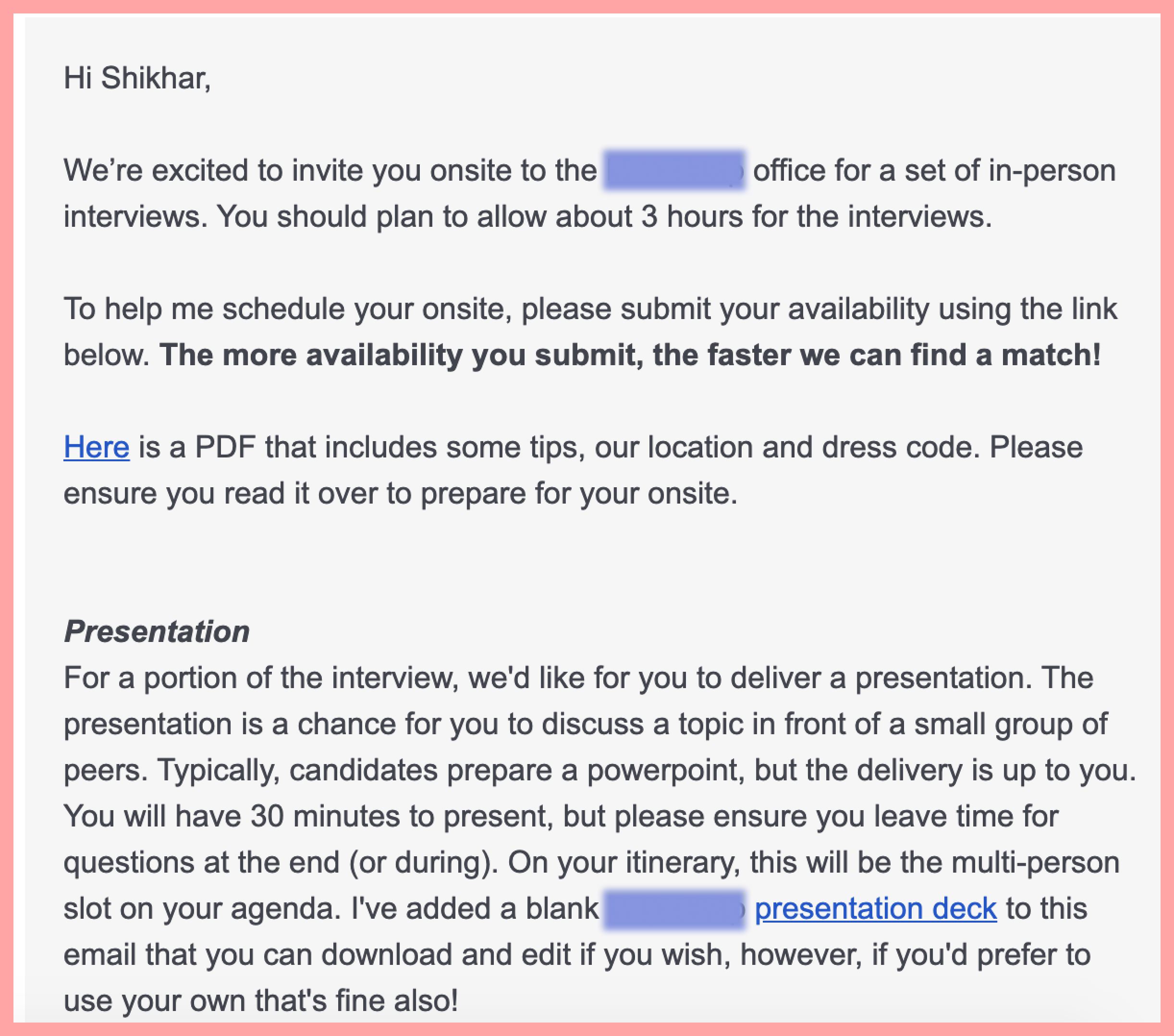
I got excited when I saw this land in my inbox. Even if I don’t get the job, at least I can tell my friends I had an onsite with ThanksButNoThanksCorp.
Mom comes into the room and I tell her. She’s excited too.
After gulping down a bowl of cereal, I start reading through all the prep material they sent over. This is not going to be easy, I know that much.
Before Dad goes to bed, I have a quick chat with him. I remind him how I checked the “I will not need Visa Sponsorship” checkbox. Truth be told, I’m just a tiny bit nervous. Should I mention this to them now? Before the onsite?
Dad and I both agree that for now, it’s alright. No need to mention. If it’s an issue, we can deal with it later, after I’ve hopefully done the heavy lifting.
If I had another 5 interviews lined up, maybe things would have been different. I’d have emailed them right now and asked if this might be an issue. But I didn’t.
A week later, I packed my bags and hopped on a flight to SFO. My last ever semester at Cal was getting started.
And my onsite interview was exactly 14 days away.
Fight Camp
My final semester begins and I ignore all my classes to just focus on this onsite interview. I’m George Saint Pierre about to fight Bisping. And there’s no way I’m leaving anything upto chance.
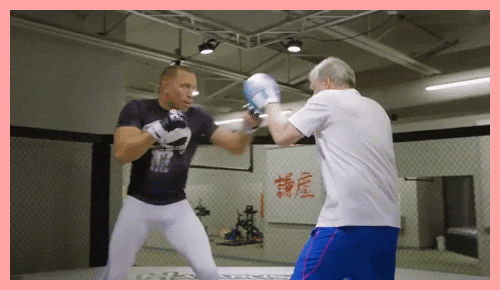
I tend to operate on either side of extremes, working out every single day or slacking off for weeks at a time. I learned to code by putting in 2 hours every single day for a year. 7 days a week is easier than 3 days a week.

So that’s how I prepped for this onsite interview. I would skip class, read about ThanksButNoThanksCorp, and listen to talks their CEO gave. I wanted to live and breathe the company, be their number one champion, and show them what I could do.
In retrospect, it does seem a bit excessive, but at the time I couldn’t care less. I even bought a green notebook from Walgreens to jot down all my interview prep.
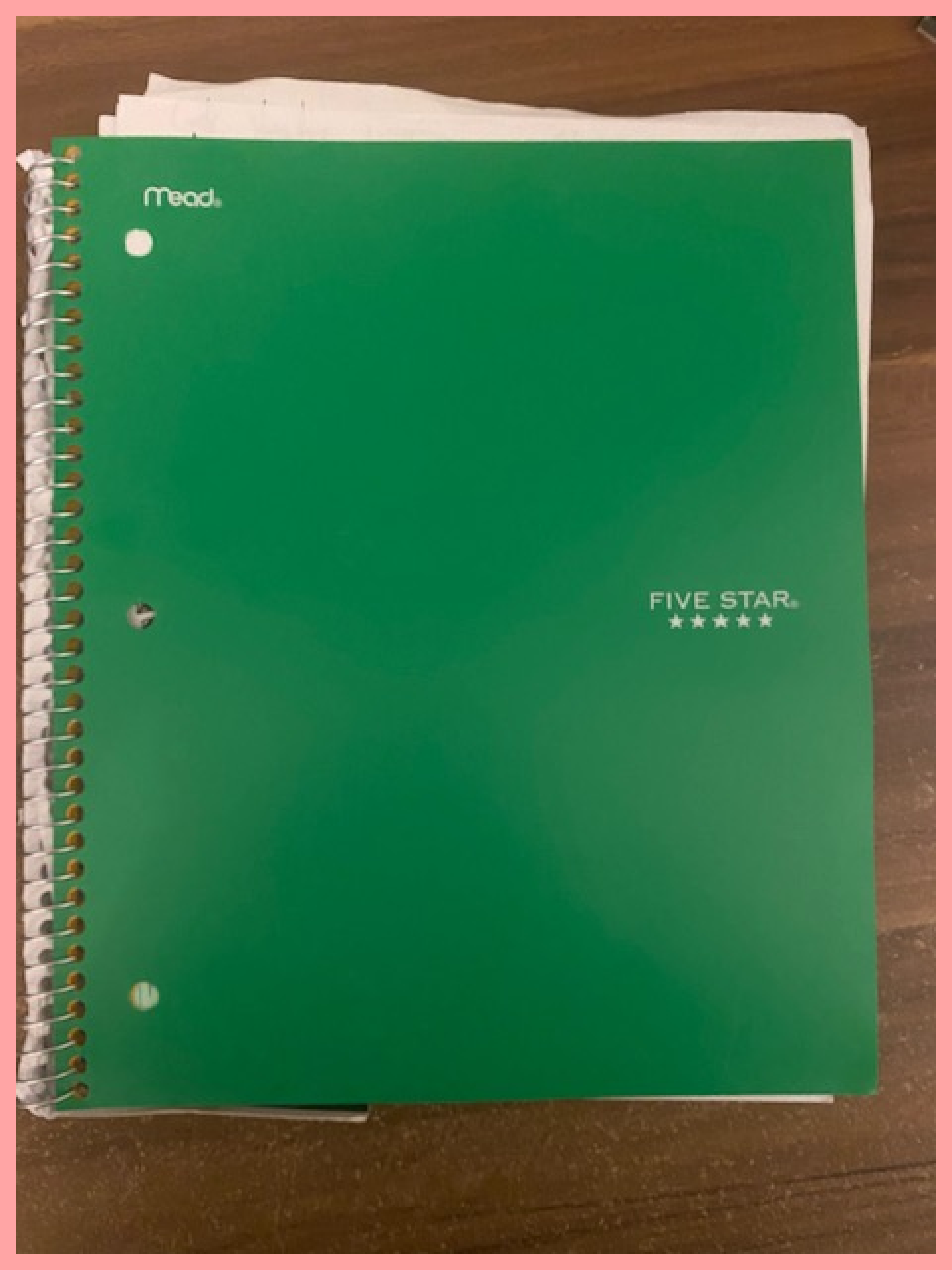
If you recall, in the onsite prep email they sent to me, I had also been asked to create a presentation in advance. The prompt for the presentation was the following:
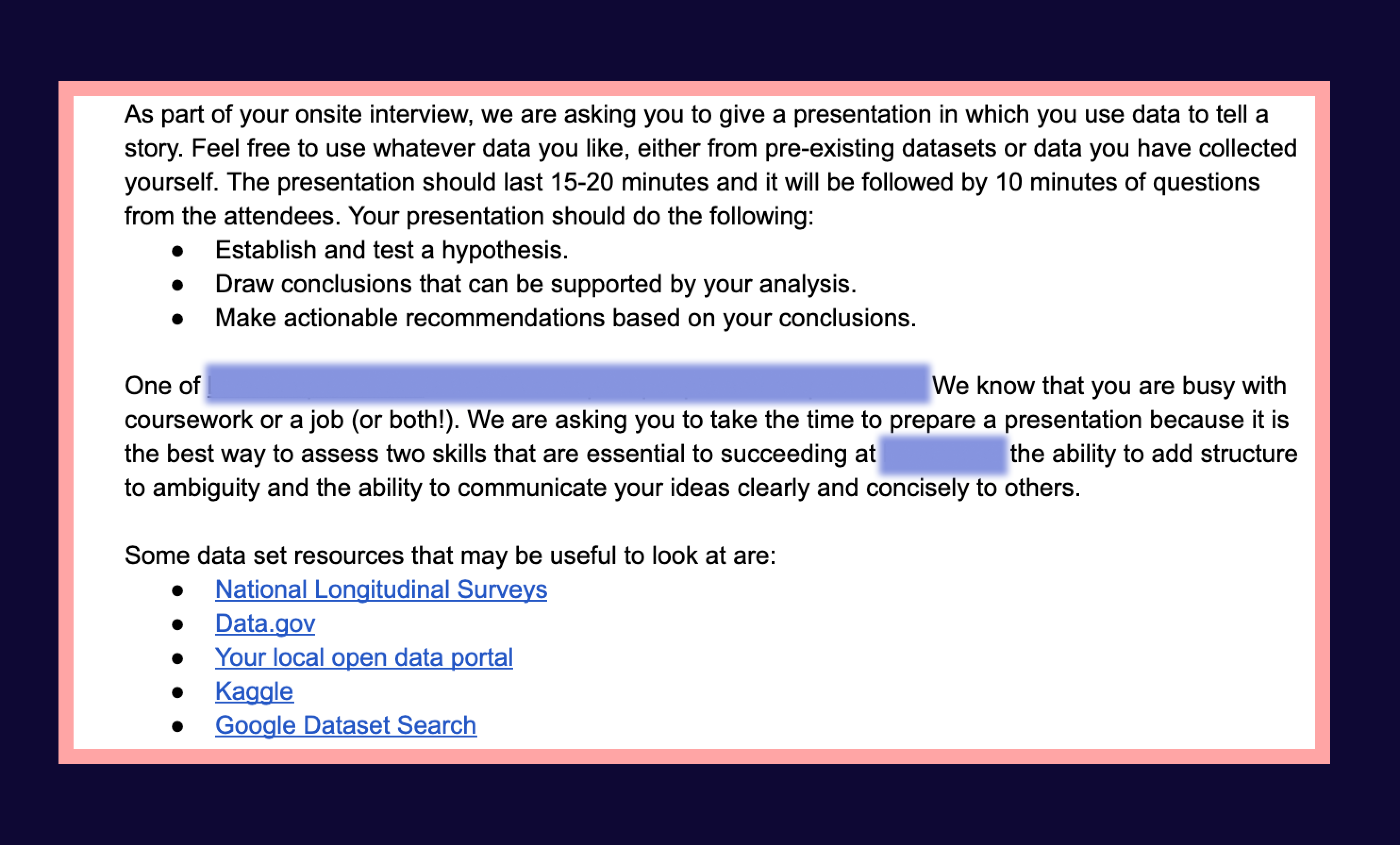
I decided to leverage some of my classwork from econometrics and focused on the topic of the Death Penalty. My strategy was to combine the analysis I had done in class with some philosophy regarding the ethics of the death penalty.
I was hopeful that this was my way to stand out, my way to get a bit of an edge over other candidates.
7 Days
I’m a week away from the onsite now, feeling like I’m in pretty good shape and continuing to fall behind on my classes at a staggering rate. But it’s okay because there’s a prize at the end of this tunnel.
I know what ThanksButNoThanksCorp does, which is actually pretty impressive because they operate in a complex industry. I’ve got the basics nailed down - why I want to work there, what I’ve done, where I want to be, and why I’m a good candidate. And this is what my onsite schedule looks like:
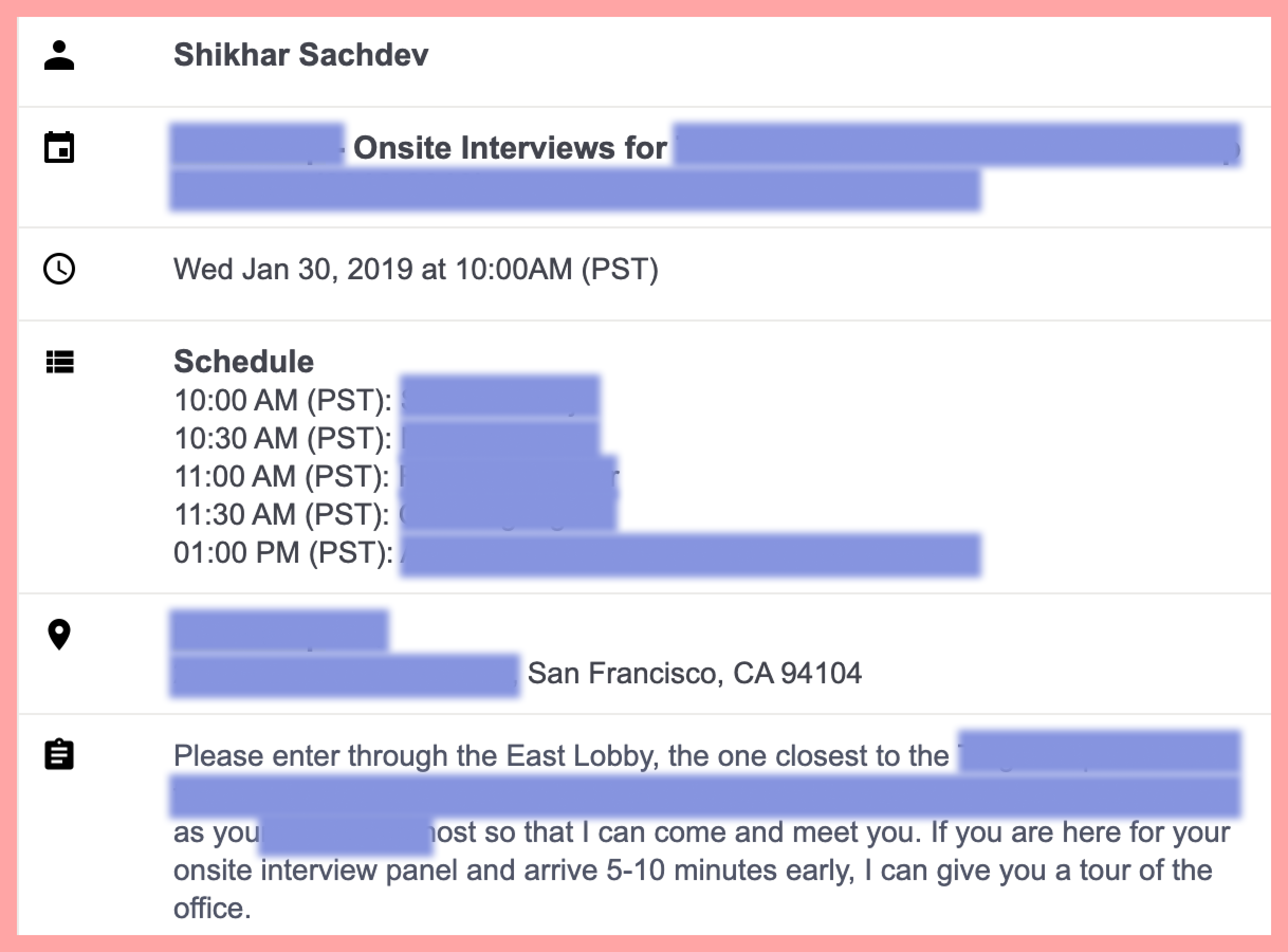
10am to 1pm. Back to back to back to back.
I go on Glassdoor again to try and figure out what they might ask me for their “case interview type” questions, similar to what I asked during my phone interview. Glassdoor is almost always useless and this time appears to be no different. Or so I thought.
I found around 20 questions listed by reviewers that were asked, all about a year old. There’s no way any of these questions are going to come up but I prep for every single one anyway. I want to stop at Question #15 but I keep going just in case. I handwrite the answers in my green book, leave the Main Stacks library, and walk home by myself.
The Night Before
So this is it. Tomorrow is fight day, and by now I’ve spent the last 2 weeks ignoring all my coursework and managed to only go to Kips, my favorite bar, once.
I’ve invested a total of 35 hours into the interview process so far:
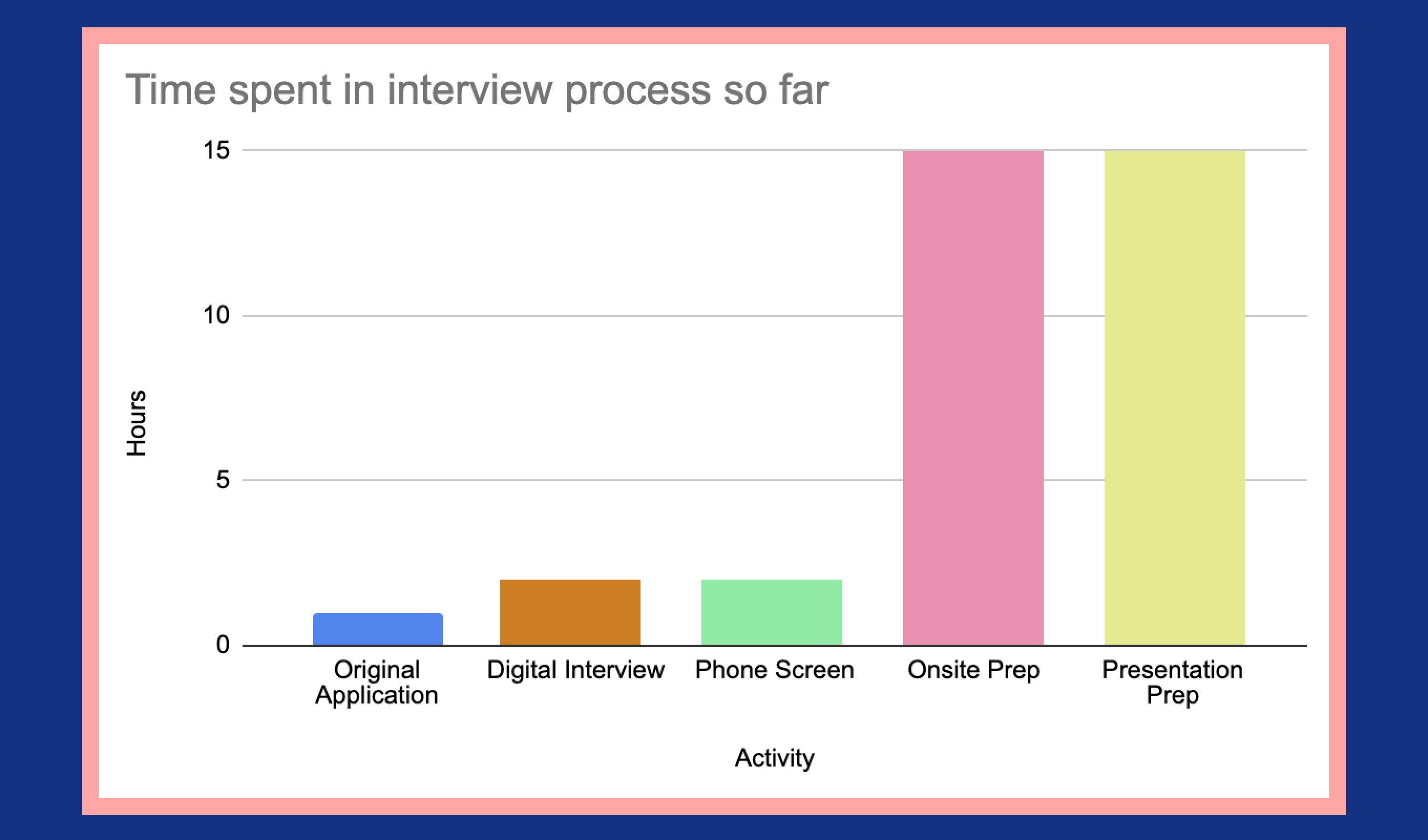
One final time, though, I head on over to Dwinelle Hall and practice giving my twenty minute, 37 slide powerpoint presentation on the Death Penalty to two friends. They grill me hard, ask probing questions, and tell me I’m ready.
That night, I set my alarm for 8am, put aside some not-too-casual clothes (a collared shirt and black jeans), drink some water, and go to bed. I’ve got millions of thoughts flooding my head but eventually the exhaustion of the last two weeks wins over any anxiety I might have about tomorrow.
Fight Day
All the best athletes in the world have their own routines on game day. Maradona would stroll on the pitch the morning of the game visualizing scoring and the crowd going wild. George Saint Pierre would take a nap right before his fight to ease his nerves.
I woke up on fight day and promptly cut myself whilst shaving. And it wasn't even a small cut - my upper lip was bleeding and I had to apply a bandaid to cap that bad boy.
The last time this happened, I got lucky. So I take it as a sign from god, gobble down a banana, and call my Uber.
I arrive 30 minutes early and admire the office building. Whilst my mom is texting me some last minute mom stuff, I take the opportunity to go to a Target nearby and grab myself some chocolate milk.
10 minutes away, now. I’ve got A$AP Rocky in my ears, Nesquik in my body, and most importantly a good feeling about today.
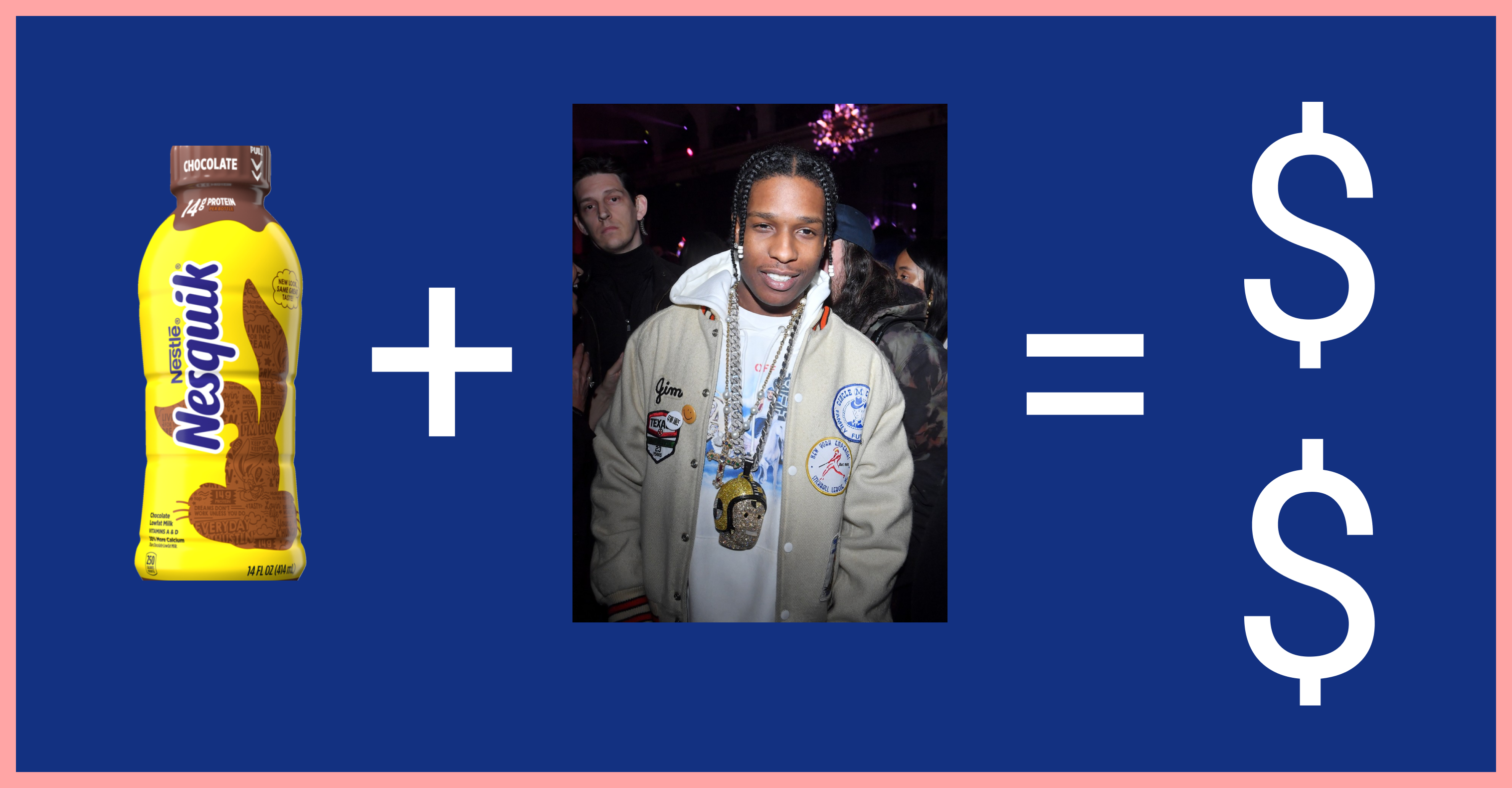
I feel nervous, but it’s a good kind of nervous. It’s the feeling you get when you’re about to do something that’s important to you.
One way I can describe it is that during my 3.5 years at university so far, I’ve sat my fair share of exams. And at the beginning of many of those exams, whilst I was sitting in a big classroom watching the proctor distribute papers out, I’ve had a sinking feeling in my stomach. A bad kind of nervous feeling. This is different. I know I’ve prepared enough. And I let that feeling settle as I get in an elevator for the 17th floor.
The office is really nice and I can understand why all the engineers want to work here now. An HR lady with the demeanor of a Sorority Recruitment Chair greets me and asks me to wait in a room that seems to have been specifically designed for interviews. It’s got a whiteboard, a bottle of water, and two comfy chairs. I’m told that all my interviews are going to take place here.
I’m adjusting the bandaid on my lip when a few moments later, the door opens, and Interview #1 begins.
Interview #1
I’m speaking to a Harvard grad. I know because I looked her up on Linkedin a few days ago. We make small talk and then she drops a bomb.
Question #15. Glassdoor. The next 40 minutes are going to be spent talking about a question I had already prepped for in its entirety.
She asks me to explain how I’d use some type of technology to improve something in the world. ThanksButNoThanksCorp is, after all, a technology company she points out. If I hadn’t prepped for this, I’d probably stumble over my words and come out with some half baked answer, but I’d done my research.
I spoke about how AI could be used to modernize the power grid, by analyzing sensor data. The power grid was built a long time ago and applying the modern developments we’ve made in AI to it would make it much more resilient, safe, and accessible.
The Harvard grad ate it all up. She asked a few questions to try and understand the specifics of what I said, but I had done enough.
1 - 0.
Interview #2
My next interviewer asks me how I’d map a list of Twitter users onto Facebook. I had seen this question on Glassdoor too. But my prep for it wasn’t as good as the last one.
I mention things like email, IP, name, etc. This guy is completely unmoved. He’s just taking notes and asking me to keep naming things. At one point I go, well I could use ThanksButNoThanksCorp’s services to do this, right? He looks at me like I’ve just insulted his whole family.
He asks me to ignore this possibility and continue listing ways I could answer his original question. This basically goes on for 20 minutes, until I just go “yeah, that’s pretty much all I have”. I’d say this round belonged to ThanksButNoThanksCorp.
1-1.
Interview #3
Since I could see the list of people who’d interview me beforehand, I had already looked up this person and realized he had spent some time in my birth country, Cameroon. Since you don’t meet a fellow Cameroonian everyday, I had pre planned that this would make for an awesome conversation.
Luckily for me, this was the behavioral interview and he asked me to tell him a bit about myself. I mentioned I was born in Douala, his eyes lit up, and it was pretty much game over.
Credit for that one goes to mom and dad. Thanks - although being born in the US would’ve been better.
2-1
Interview #4
Okay, I’d be lying if I said I wasn’t pretty excited at this stage. I’ve put my best foot forward and my preparation has come to the fore. I’m tired though. It’s been 90 minutes of non-stop action, the bandaid on my lip keeps coming off, and I could kill for some more chocolate milk.
But if I can get through the next 30 minutes, I then only have the presentation remaining. And I’m confident about that. I quickly use the restroom and wait for my next interview.
The interviewer comes in five minutes late. He hands me a whiteboard marker, starts talking to me about a hypothetical acquisition scenario, and then asks me a bunch of questions on how I’d structure the acquisition.
I get stuck.
I spend around 40 seconds thinking in silence before saying something. He follows up immediately, questioning basically all my assumptions, and then I’m back to thinking in silence. He encourages me to use the whiteboard. I use it.
This is definitely the toughest round so far. And until 5 minutes to go, I think I’ve bottled it. But this time, instead of remaining silent, I think out loud. I tell him exactly how I’m going about solving the problem, I let him analyze all my assumptions. I let myself be vulnerable.
Whenever I start moving in the right direction, he encourages me on. I can tell he wants me to succeed. A few minutes later, it’s over. I’ve made a good fight of it, but I still think it’ll count against me.
2 - 2
Interview #5: The Presentation
So it all comes down to this. They call them the championship rounds for a reason.
If I execute and present like the way I’m used to, I think I’ll have done enough to have my arm raised. But if I don’t, given how competitive the hamster wheel is, they’ll have no problem tossing me away and handing me a $15 Starbucks gift card for my troubles.
Billionaire guru Gary Vaynerchuk is famous for giving the advice that people should double down on their strengths and ignore their weaknesses.
I’m a good public speaker, so I had deliberately structured my presentation in a way that would highlight my storytelling skills. I probably couldn’t beat other applications with the quality of the data I had analyzed. But I had a chance if the quality of the narrative I built was strong enough.
So for the next 15 minutes, I told the story of the death penalty in America. I spoke about Ted Bundy, mixed in philosophical arguments about two different types of views, and used facts and figures so that my quantitative chops wouldn't be doubted.
The three people I presented to asked me a few questions. I had prepped. I was ready.
3-2
Result Time
I left ThanksButNoThanksCorp’s office thinking that I had done enough. I was exhausted, but had a grin on my face. Everything was out of my hands now. All I knew was that I had given it my 100%.
I picked up some Basil Chili Chicken on the way home. Watched some funny videos on Youtube. And fell asleep pretty fast that night.
I wake up the next day and chill out. I’ve got coursework to catch up on but that can wait till the weekend. At around 5pm, the following email lands in my inbox:
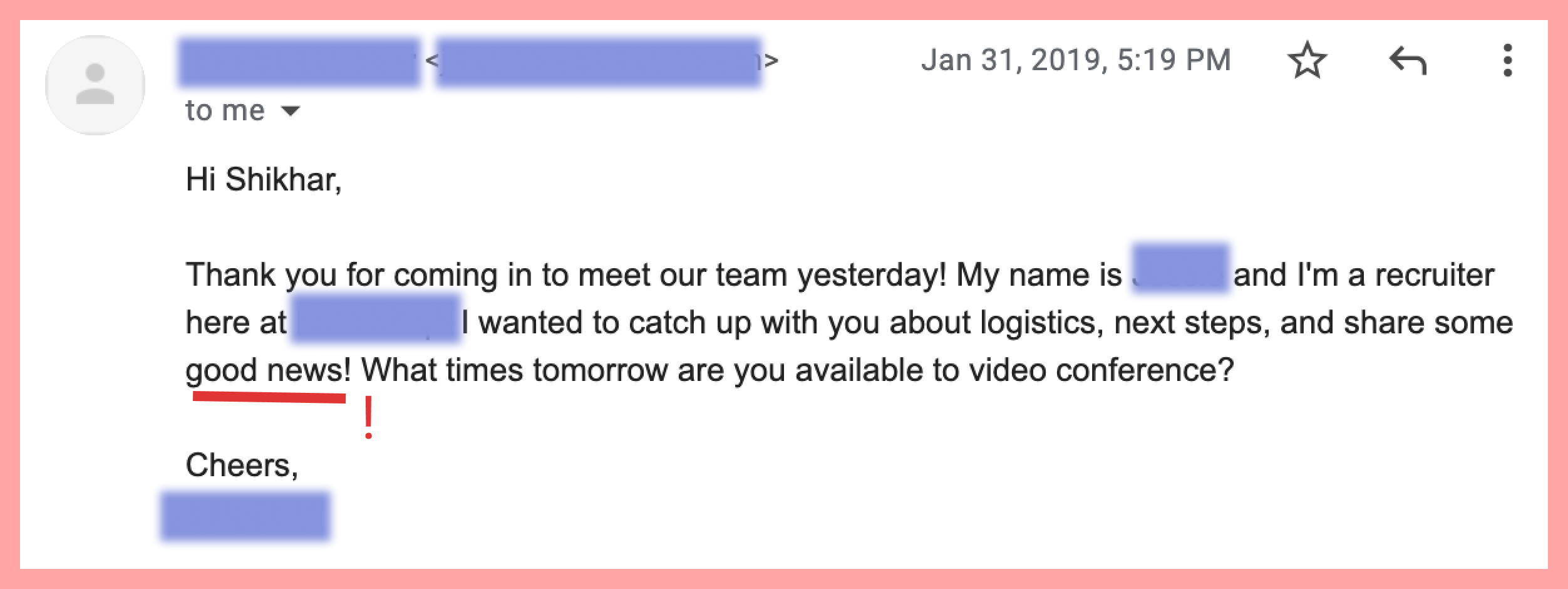
I don’t know about you, but when I see “good news” written in this context, I can only assume that I got the job. I set up a call for tomorrow with the recruiter, who we should give a name to because she plays quite an important role over the next few days. Let’s call her Jess.
I call my dad and tell him what’s up. Boy is he excited.
At the back of my head, though, I know that there’s a chance this doesn’t end well. Visa sponsorship is a tricky subject to navigate. I’ve said it before and I’ll say it again: I don’t need visa sponsorship for 3 years!
I don’t. I don’t. I don’t.
But red tape is a thing and companies have rules. After having come this far, it’d be a shame to go home empty handed. All I can do is try to remain calm when that question invariably comes up tomorrow.
Before going to bed that night, I’m having a conversation with my roommate Anish. I tell him I’m worried about this visa stuff. He reassures me that companies will do what is needed to recruit the best talent. Nothing to worry about.
I doubt that.
But that night, I fantasized a bit. I fantasized about building a life in San Francisco and about being a big boy working a big boy job. I let myself forget about the harsh realities of visa sponsorship and just focused on what had gone right.
I had wanted something, worked hard for it, and now I was about to get it.
The Call With Jess
The morning of my call with Jess, I get the bright idea to take a look at ThanksButNoThanksCorp’s H1B petition filing history online. They’ve literally been filing petitions left, right, and center for the past 3 years. Why should visa sponsorship even be an issue, then?
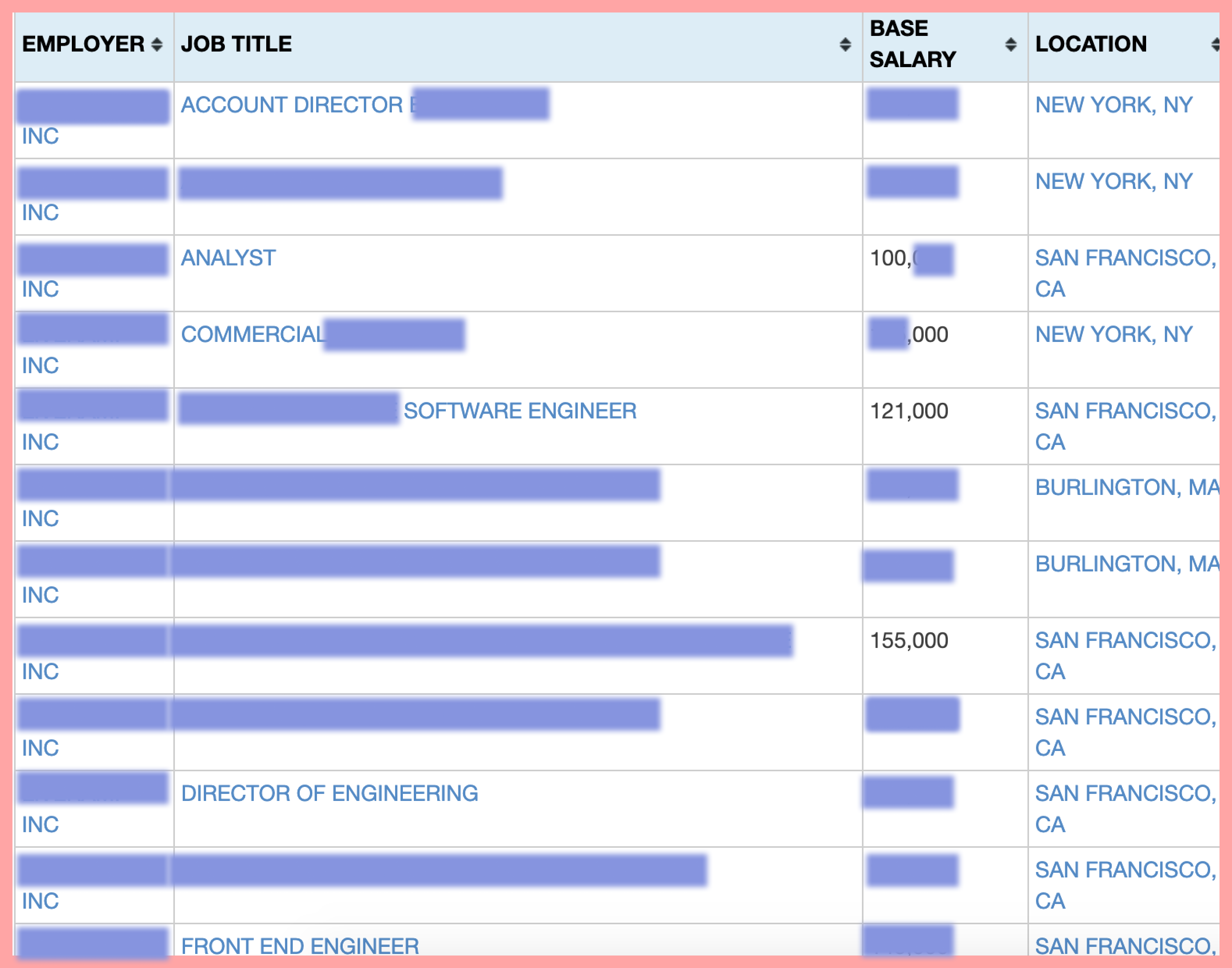
1 hour later I’m on the phone with Jess, who sounds pretty much like every other recruiter I’ve spoken to. She sounds like she’s your friend but really she’s not.
We get 60 seconds of small talk out the way and she tells me that I have indeed got the offer. But then she tells me that she needs to check a few things first.
She asks me to confirm that since I marked the “I will not need visa sponsorship” checkbox, I’m a US resident.
Yeah, so about that..
I tell her about my stem degree. About how I’m eligible for OPT and don’t need any visa sponsorship for a minimum of 36 months. She’s confused.
“So, you’re not an American resident?”
“No, I’m not”.
“Hmm, this might be a problem. Let me check internally and get back to you”.
“Before you do that, just wanted to check - it seems like you guys sponsor H1B visas, what would be the problem with sponsoring one for this role? Is it the cost or what?”
“It’s not the cost, it’s the fact that this role is not really eligible for sponsorship. I’ll have to check and get back to you.”
The call ends. Just like that, 40 hours of work is about to go down the drain.
There’s a few things I unpacked mentally. First up, I don’t even need sponsorship for a minimum of 3 years. Who stays at their first job for longer than 3 years? Second, let’s assume I do. Jess claims that this particular job position is not eligible for a H1B visa because it’s too broad - too general.
That’s not true!
Let me give you a few more details on the role. I had applied for a rotational new grad role. You can think of it as similar to Facebook’s Associate Product Manager program or Google’s APM program.
Plenty of companies offer sponsorship for rotational programs like this. I’ll get to this a bit later in this story.
The worst case scenario that I had imagined was in fact now the most likely. I could see all my hard work evaporating right in front of my eyes.
I had accomplished something on merit and now it was being snatched away from me, just because of my nationality.
48 hours later, Jess sends me the following email:
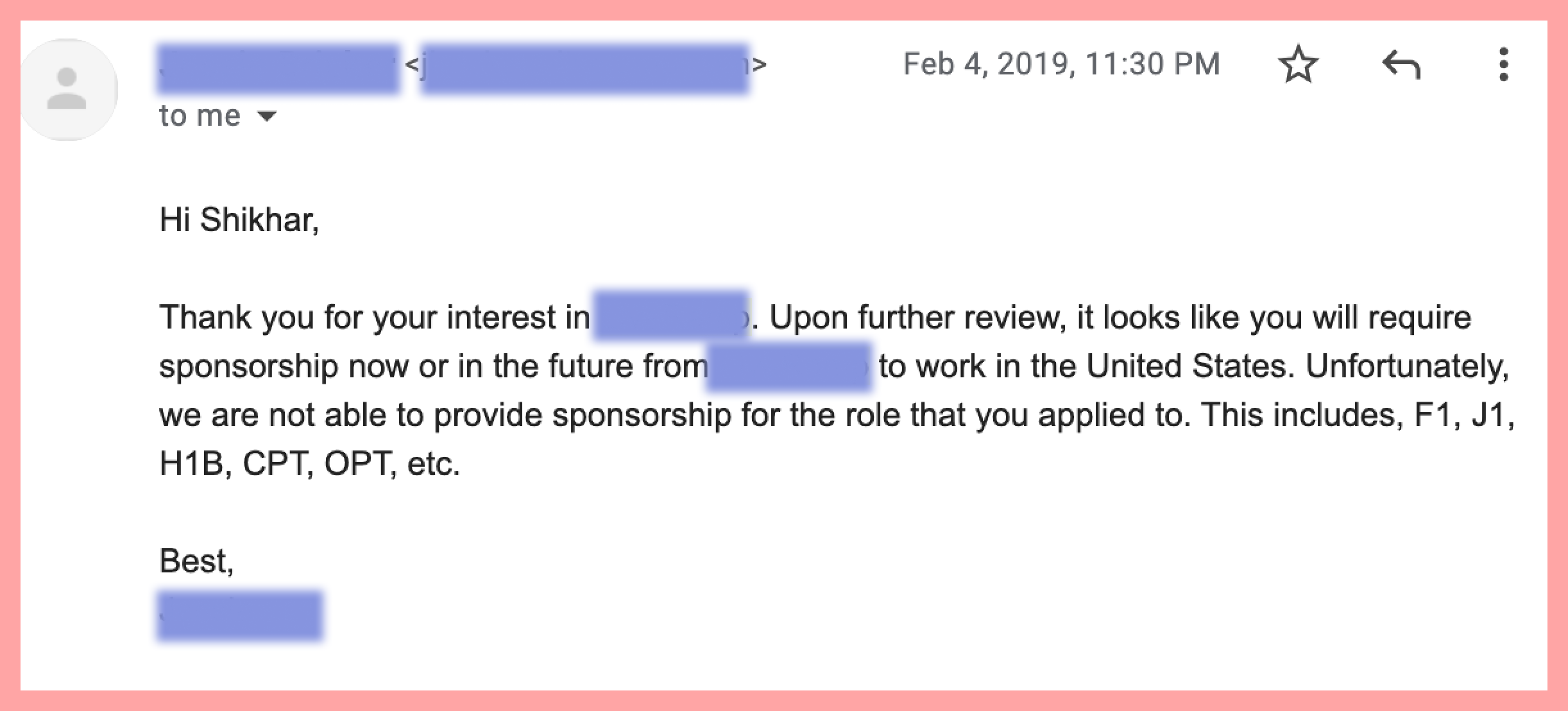
They rejected me. And vomited out a bunch of visa acronyms whilst doing so.
4 sentences and my 50 hours of hard work is meant to vanish just like that.
This is where the story should have ended. I got rejected. I feel bad about it. I move on with my life.
Alas, I’ve watched one too many Rocky movies and I’m not ready to give up just yet.
Extra Time
I have nothing to lose now. I know that I’m good enough to get this job on merit. The numbers don’t lie. 3-2. Now it’s just a matter of getting them to understand that they can hire me without any legal worries.
The first thing I do is make a slide deck outlining exactly why their concerns are misplaced - my goal is to refute their following two claims:
- This “rotational” program based role is not eligible for sponsorship.
- I require H1B visa sponsorship to work this role.
Both these claims are wrong.
I know that I’m about to invest more hours of my life into a presentation that probably won’t get anywhere, but I’d still rather do this than work on my econ problem set.
Here’s how I structure the presentation:
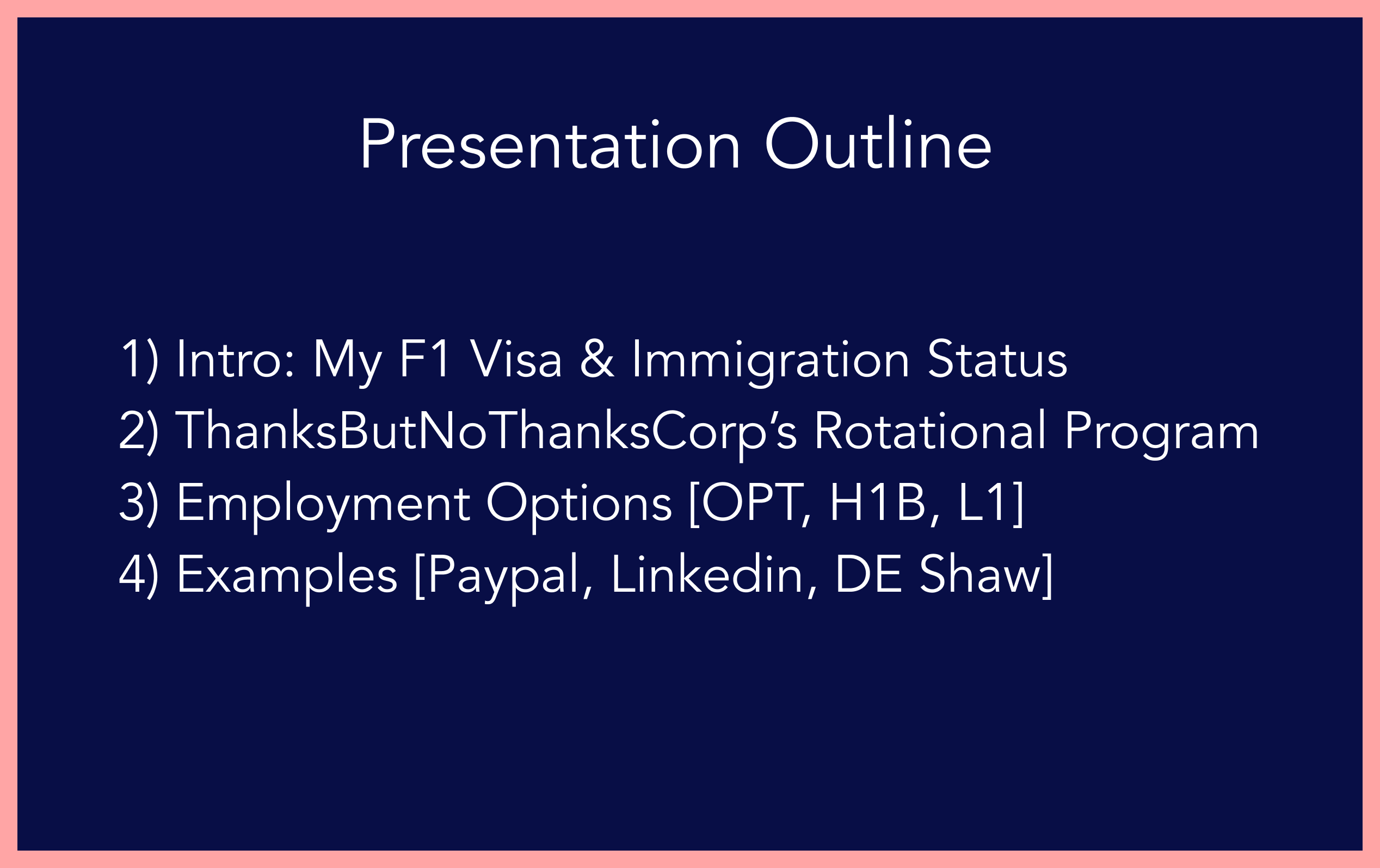
ThanksButNoThanksCorp is basically stating that rotational programs for news grads are not eligible for H1B Visa Sponsorship. So here’s how I go about proving them wrong.
First, I find similar rotational programs for new grads. From companies like Paypal, Linkedin, and DE Shaw. Then, I go on H1BData.info and look for petitions filed for those new grad roles. I’m not at all surprised when I see plenty of petitions filed. As a bonus, I can also see that the petitions had been approved.
Here’s an example for DE SHAW:

And here's an example for Linkedin:

I add all of this to my presentation. I’m no consultant but this slide deck is looking pretty meaty now.
I finalize everything in another two hours and then reply back to Jess’s rejection email.
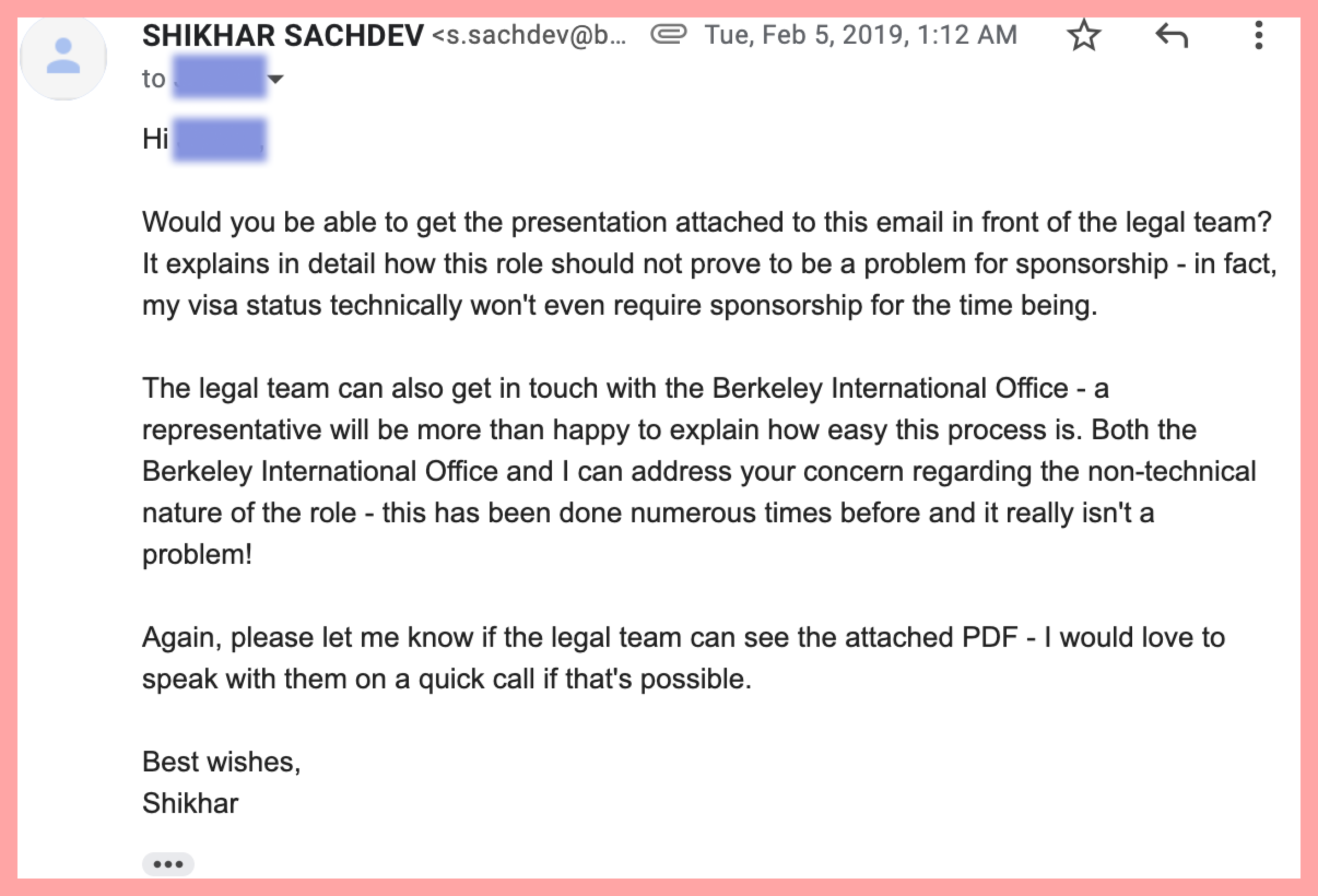
And then I wait. As you can see in the email, I’ve asked for their lawyers to get involved.
But then I think about it and realize that Jess from HR really has no incentive to forward this to their legal team. I mean, how does she benefit from me possibly getting this job? They probably have plenty of other American applicants to choose from.
So I think. Who can I email that might be actually incentivized to vouch for me internally? After some quick investigating, I realize that Interviewer #3 from the onsite is actually the head of the rotational program. That’s right - he’s directly in charge of this program I’m currently applying to.
Surely he would want to recruit someone who deserves a place in the program. Since it’s been 24 hours and Jess from HR hasn’t acknowledged my latest email, I decide to send an email to Interviewer #3.
I explain in my situation, tell him I disagree with HR, and again attach the presentation to the email. I click send.
Much to my surprise, he replies 2 hours later:
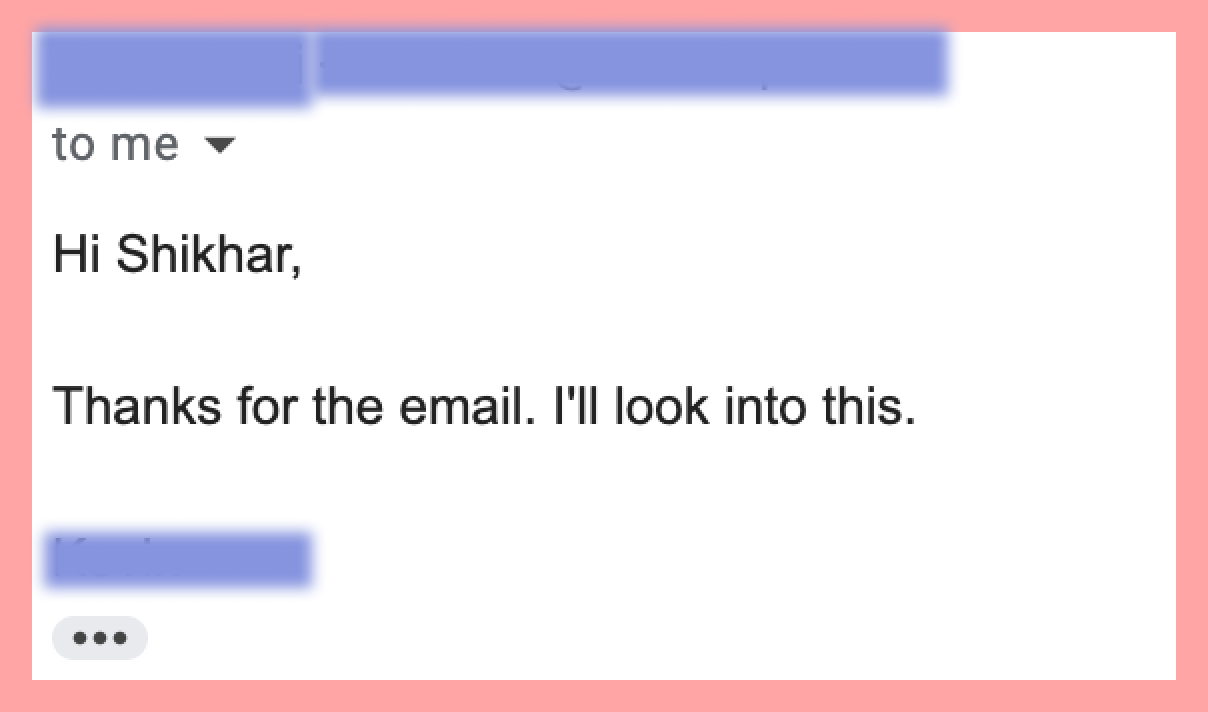
Progress. Not much, but at least my presentation's been acknowledged.
The Twist
The following day, I’m doing my best to focus elsewhere and spend time with friends. It’s kinda working until I get back home and can’t resist taking a peek inside the hamster wheel.
Linkedin’s “People Also Viewed” sidebar showed the profile of a person from Switzerland. Who had worked at ThanksButNoThanksCorp. In the exact same role that I was currently in the running for.
I’m Swiss. I took a look at this person’s profile and realized that she had gone to highschool really close to me. I was surprised and wondered how she got work authorization. Maybe she was a US resident?
So as is the theme of the last few days, I just sent her an email. And she responded:
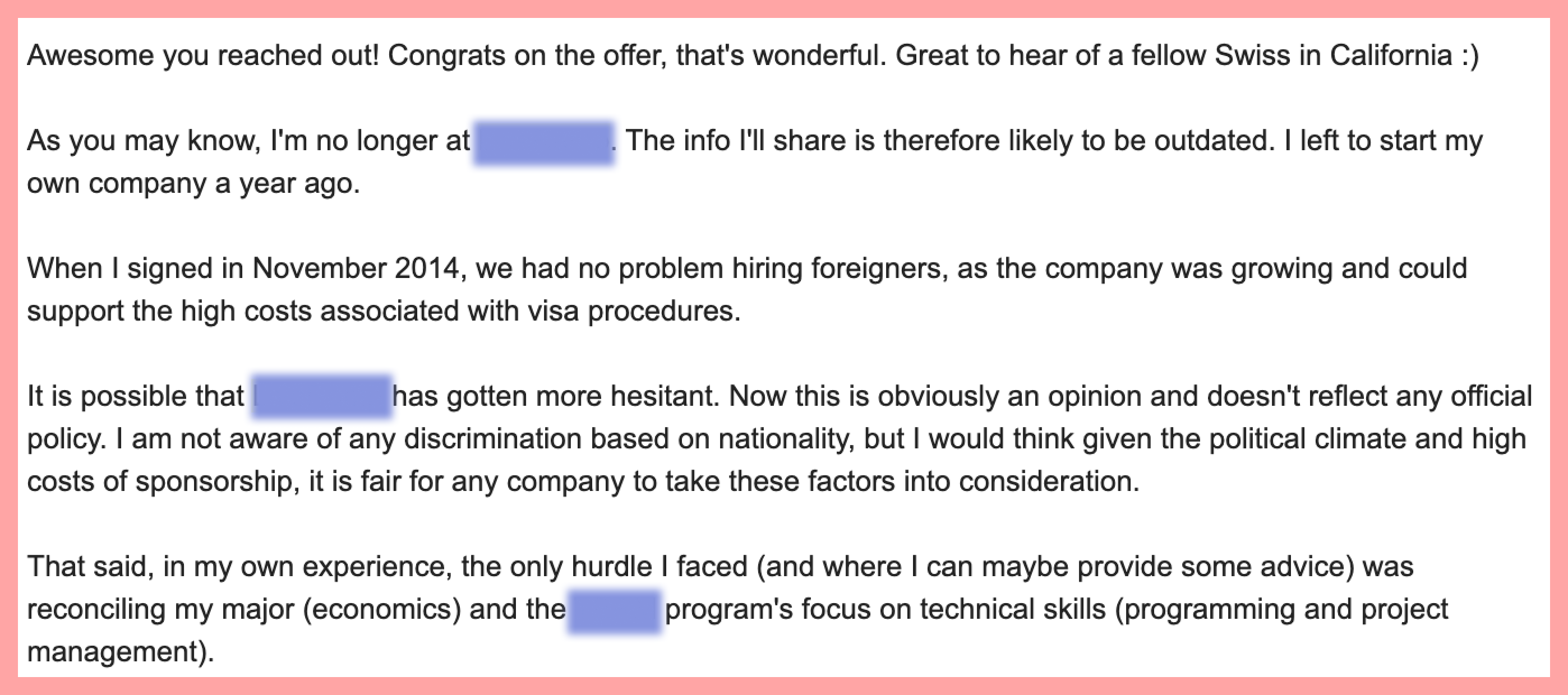
Her response meant that she had no problem getting her H1B sponsored. This was back in 2014, though, so things probably changed. But at least there was a precedent.
The End
A few days later, I get a call. It’s Jess from HR.
She tells me that it’s over.
Even after discussing with their lawyers, they’re unable to proceed. She thanks me, wishes me best of luck, and that’s the end of that. As predicted, I also get a $5 Starbucks gift card by email.
I spend a day or so feeling sorry for myself. I can sense that my parents feel worse for me than I do for myself. They’ve been part of this journey too, after all.
But the purpose of this story isn’t for you to feel sorry for me. Ultimately, you have to play the cards you’ve been dealt.
When I think about this whole experience, the part that stands out the most is what happened after I had that initial call with Jess from HR. Crafting a presentation, being proactive, reaching out to people. It would have been easy to quit after the first blanket rejection.
But I didn’t. And that’s what I’ll carry forward in whatever I do.